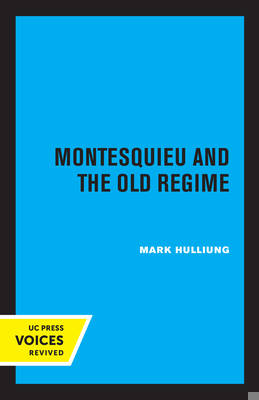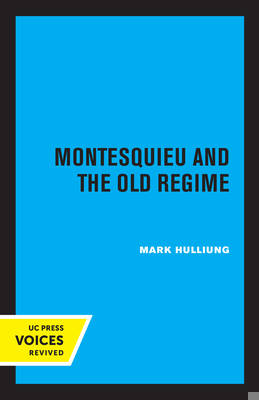
- Afhalen na 1 uur in een winkel met voorraad
- Gratis thuislevering in België vanaf € 30
- Ruim aanbod met 7 miljoen producten
- Afhalen na 1 uur in een winkel met voorraad
- Gratis thuislevering in België vanaf € 30
- Ruim aanbod met 7 miljoen producten
Zoeken
Omschrijving
Montesquieu and the Old Regime offers a bold reinterpretation of Montesquieu's intellectual and ideological legacy, challenging conventional views that label him as a conservative apologist. Instead, the book situates Montesquieu as a sharp critic of the Old Regime and a visionary advocate for a national republic and democratic society in France. Drawing inspiration from England, Montesquieu envisioned a political system that dismantled monarchical and aristocratic structures. Through detailed analyses of his major works, such as The Spirit of the Laws, The Persian Letters, and Considérations, the author reveals Montesquieu's systematic critique of absolutism and his engagement with theories of divine right and raison d'état, presenting him as a pivotal figure in republican thought. The book delves into Montesquieu's dual role as a critic and idealist. It traces his intellectual evolution from deconstructing Old Regime ideologies to crafting an alternative vision grounded in the republican tradition of Aristotle, Machiavelli, and Harrington. The analysis highlights how Montesquieu's works, particularly The Spirit of the Laws, reflect his mature thinking and aspirations for civic renewal through republican governance. By integrating his unpublished writings, such as the Pensées, and emphasizing the continuity in his thought, the book positions Montesquieu as a transformative thinker whose ideas extended beyond political philosophy to address broader sociological and historiographical concerns. This study not only deepens the understanding of Montesquieu's legacy but also situates him as a key voice in the intellectual movement challenging the Old Regime. This title is part of UC Press's Voices Revived program, which commemorates University of California Press's mission to seek out and cultivate the brightest minds and give them voice, reach, and impact. Drawing on a backlist dating to 1893, Voices Revived makes high-quality, peer-reviewed scholarship accessible once again using print-on-demand technology. This title was originally published in 1976.
Specificaties
Betrokkenen
- Auteur(s):
- Uitgeverij:
Inhoud
- Aantal bladzijden:
- 270
- Taal:
- Engels
Eigenschappen
- Productcode (EAN):
- 9780520335547
- Verschijningsdatum:
- 19/08/2022
- Uitvoering:
- Paperback
- Formaat:
- Trade paperback (VS)
- Afmetingen:
- 140 mm x 216 mm
- Gewicht:
- 349 g

Alleen bij Standaard Boekhandel
+ 135 punten op je klantenkaart van Standaard Boekhandel
Beoordelingen
We publiceren alleen reviews die voldoen aan de voorwaarden voor reviews. Bekijk onze voorwaarden voor reviews.








